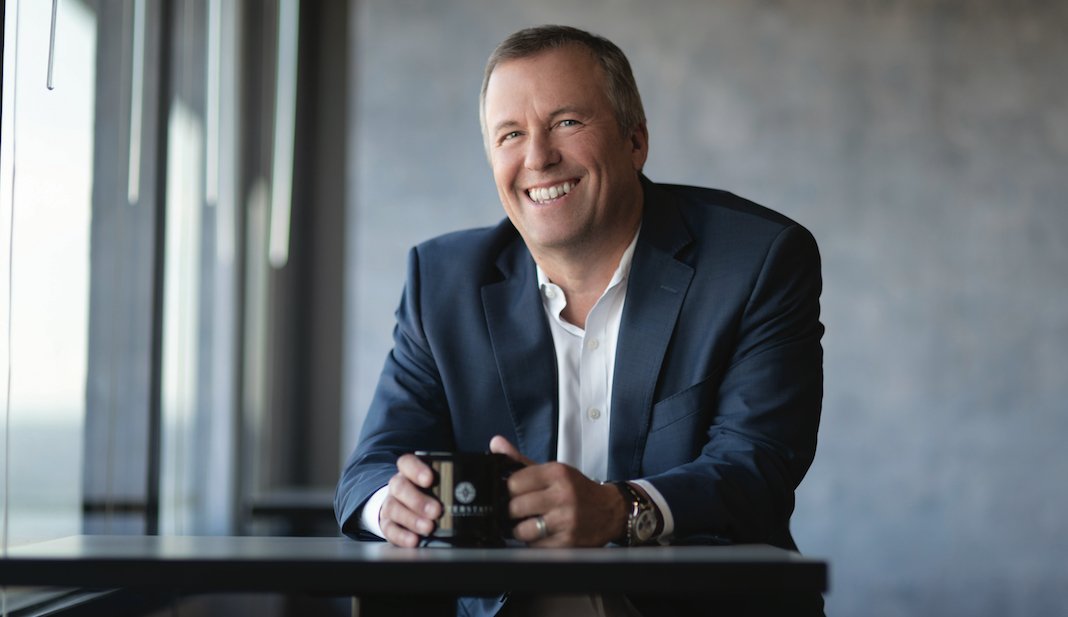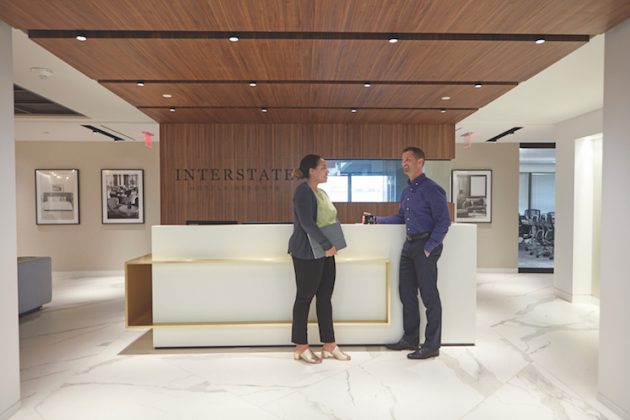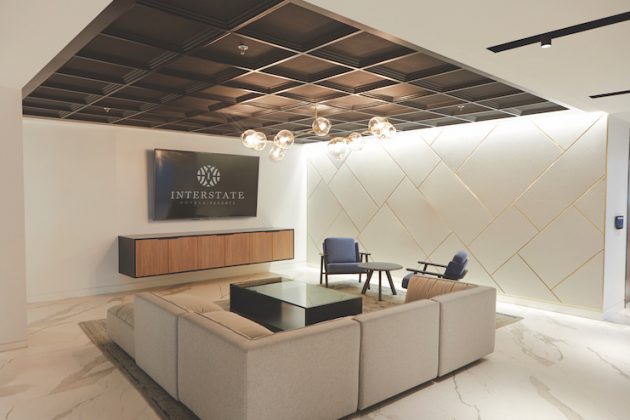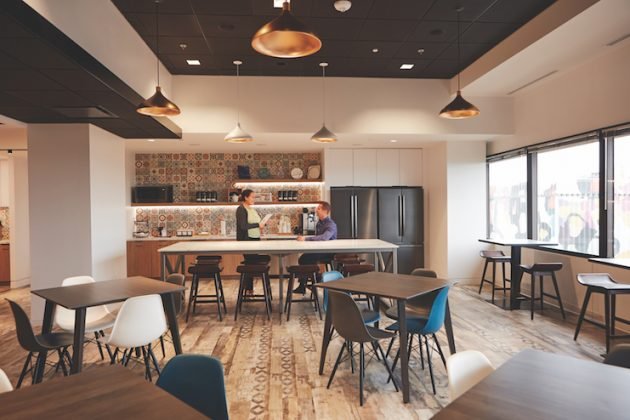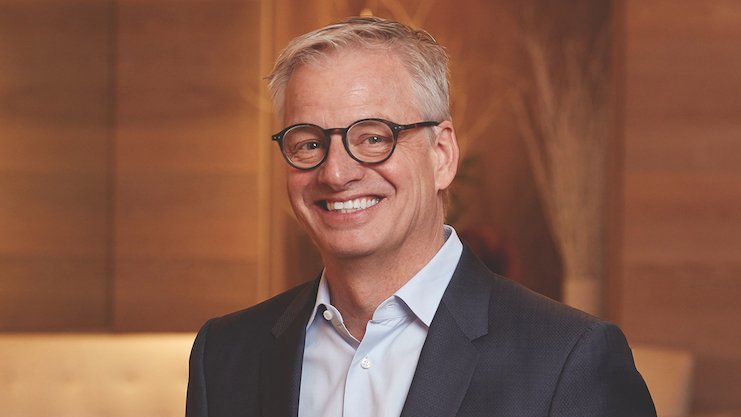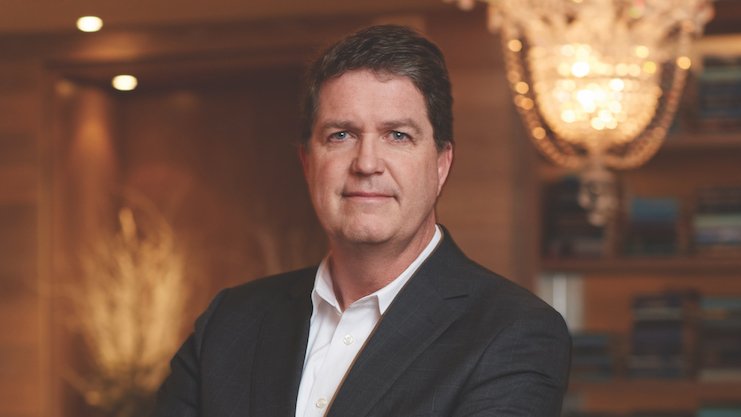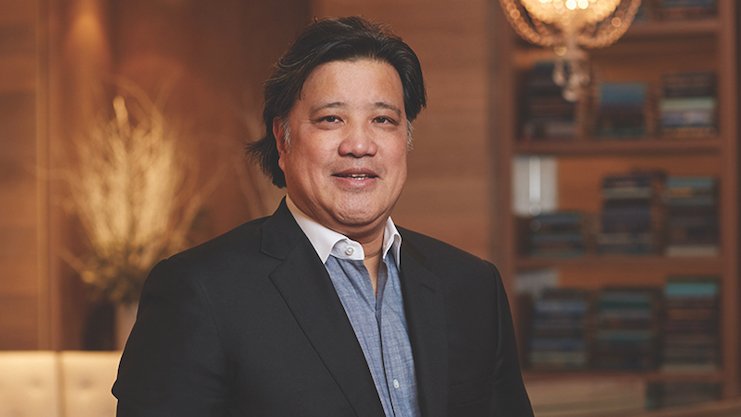When Mike Deitemeyer was named president and CEO of Interstate Hotels & Resorts in March 2017, he joined a company that already had more than 50 years of success under its belt. For most people, such a prospect would be completely daunting; for Deitemeyer, however, it was an exciting opportunity to take a thriving company to the next level.
Since taking on his current role, Deitemeyer has spearheaded initiatives to grow Interstate’s profile and portfolio. He’s traveled all over the country, visiting hotels and hoteliers at more than 70 Interstate properties in a series of “road shows.” He’s creating new positions and has hired top executives. He also moved the company to a new headquarters in Arlington, Va., that can better accommodate Interstate’s accelerating growth.
LODGING visited Interstate’s new headquarters to see what the Deitemeyer era was all about, and the biggest takeaway? Deitemeyer’s aggressive strategies have not just resulted in growth for Interstate, but have also inspired his team.
When you came to Interstate, it was after more than 20 years with Omni Hotels. What did you bring with you from that position to your current role?
I actually want to start further back, before Omni. My first hospitality job after graduating from college was with Interstate. I was an area controller. This position gave me a deep financial understanding of the hotel industry, and I learned how to run a hotel profitably. I still rely on what I learned then in my current role.
At Omni, I learned something just as critical to my current position—how to grow a team and ensure that it functions cohesively. We grew enormously during my time there, and that was because of the team’s buy-in of our mission. That’s something I see now with Interstate. People have to feel a connection with the vision of an organization, and if they do, you’ll be successful. We’re currently in the process of relaunching our core values. [Editor’s note: They have since launched.] If everyone can relate to those values, they’ll evolve with the company. This can be done without spending a fortune on programs or trainings. All you have to do is be honest, sincere, and truly focus on a goal.
What are your top priorities as you close out 2018?
Up until this point, I’ve been really focused on augmenting our team to better prepare us for next steps, and getting that team out to our hotels so that our owners and managers can get to know them. Now, it’s time to deliver on everything we’ve promised those owners.
First, we’re leveraging our new team members’ relationships to open new business channels, ones that Interstate hasn’t traditionally been active in. I want to prove that having this big engine in the Interstate headquarters allows us to serve more verticals than ever before, and serve them better than we have in the past. So now we have teams for different types of hotels, from luxury resorts to extended stay, as well as nuanced operations teams that specialize in areas such as IT, finance, and HR to help us be the best-in-class solution for our portfolio of properties.
This approach is absolutely working. Right now, we’re approved to manage more than 50 brands in all different market segments, with approval pending for even more. These opportunities open even more doors for us, which is exciting.
Beyond this, we’re also developing training programs, self-directed development programs, and working with the American Hotel & Lodging Association (AHLA) to offer apprenticeship programs, management development programs, and more.
The end game is global domination [laughs].
Interstate has a reputation in the hotel industry for managing big- box hotels. What are you doing to change that perception?
Well, Interstate was founded originally on suburban, full-service products for companies like Marriott and Hilton, so that makes sense. We’ve still got a big chunk of that market share, but have lost some ground over time. We’re working to win back some of these properties, but we’re also looking to add hotels to our portfolio outside of that big-box, full-service market segment, not to mention other types of businesses. For example, in the last year, we’ve added two standalone restaurants through other relationships and transactions. One’s independent and one’s a TGI Fridays, which is part of this cluster of hotels we acquired. It’s by Chicago Midway Airport, and is in the middle of a bunch of select-service hotels. This has led us to look more critically at the restaurants in the hotels already in our system, as well as looking at opportunities in that space that we never would have looked at before.
We’re also bringing on people to help us with this transition. In April, we hired Fernando Salazar as our senior vice president of food and beverage. I’ve known Fernando for a long time, and his last job was managing director of the Culinary Institute of America’s San Antonio Campus. His expertise opens doors for us in areas that previously weren’t even on our radar, like the free-standing restaurants. We’re also currently talking with one of our owners about managing the restaurant in his office building.
“I think that our ability to work outside of our norms is a testament to our reputation in the industry and the relationships our team members have built with owners. People want our expertise, even when it isn’t in the area we’re most known for.”
So you’re really branching out from what used to be Interstate’s norm.
Absolutely. We’ve also added a couple of asset-managing jobs, which wasn’t something we were doing before. We’re asset managing a Marriott right now, which is interesting and different. I think that our ability to work outside of our norms is a testament to our reputation in the industry and the relationships our team members have built with owners. People want our expertise, even when it isn’t in the area we’re most known for.
How can you ensure that you’re still delivering top-level services to all of these different kinds of clients?
We’re actually specifically training our vice president of operations to work with all of the different types of owners in our portfolio and understand how their objectives differ from hotel to hotel and from market to market. Some owners want to buy a hotel and keep it for decades, reinvesting in the property as it needs updates and keeping it as an ongoing source of income. Others want to buy and sell properties quickly to make a profit. There’s nothing wrong with either of these approaches, but as a third-party manager, we need to be sure that our teams understand the differences between them. How an owner looks at a property requires us to adjust how we approach issues like maintenance or staffing. We just have to be in-sync with the owner to help them achieve their objectives. At the end of the day, if we’re helping somebody be successful, they’re going to hire us for more projects, and that’s the goal.
Also, as long as we’re working collaboratively as a team, we know we’ll be able to deliver. At the end of the day, hospitality is a people business, and we have amazing people who understand that fact.
What’s going on with Interstate’s international portfolio?
I was actually in Russia a few weeks ago to connect with our team there. We have a pretty good-sized Russian team. We also have a big U.K. office, and opened a big new office in Amsterdam. We’re a global company, and we want to be sure we’re leveraging our global thought leaders to best understand the nuances of the different markets we serve. It’s been really interesting sharing our knowledge and getting our teams talking about evolving trends on a global scale. It’s of huge value to our company as a whole, and allows us to disseminate learnings throughout our entire team.
We’re also working to connect the people who work at our properties on a global scale. We’re planning to have an international GM conference in Amsterdam to ensure all of our GMs are on the same page about our new core values and what Interstate as a company can offer its hotels. And, as this network becomes stronger, we’ll be able to translate that strength into further growth for the company. We’re about to sign more than 20 new deals in Central Europe, including a Hilton Garden Inn at Orly Airport outside of Paris. It’ll be our first French hotel. We also have deals pending in Germany and the Netherlands. It’s a really exciting time.
One of the biggest issues in the industry right now is labor. How is Interstate working to alleviate this pain point for its properties?
First, the company is hiring and investing in more market recruiters. We’re being very strategic, using local recruiters and leveraging our hotels and the working environments they offer. We plan to wean our properties off contract labor—even if it’s inexpensive—and want to be sure that we’re offering the proper pay raises and giving our people the opportunity to grow in their careers. I’m also a believer in attitudinal hiring. Skills can be taught, but the right attitude is the most important quality in any team member.
On a higher level, I also think that our industry tends to promote people who are great technical front office managers, restaurant managers, etc., but those people aren’t always good leaders. I feel that as an industry, hospitality doesn’t invest enough in leadership skills, and that’s something we’re aiming to change with our properties.
All of these labor-focused initiatives are strategically tied to our company approach and values, which are all about being the best employer for the hotels in our portfolio.
What do you see as the future of the hotel industry?
Hotels that are grounded in the local market are the ones that are going to continue to be successful. Consumer preferences are changing so quickly, but almost all travelers are looking to stay somewhere that’s plugged into the surrounding community. This is regardless of brand, market segment, or location.
On the Road
Soon after Mike Deitemeyer joined Interstate Hotels & Resorts, he and several members of the company’s leadership team embarked on a seven-city tour to visit more than 70 properties in the Interstate portfolio. Called the Interstate “road show,” this endeavor allowed Deitemeyer to come face-to-face with not only the managers at his properties, but also the team members on the front lines who interact with guests on a daily basis. Andrew Jordan, Interstate’s CMO, says that the roadshow was first and foremost designed to get Deitemeyer out and about to tell his story, but also “to demonstrate that we understand that there are no cash registers in the corporate office. We wanted to acknowledge the work that these people do and thank them for their service.”
Jordan notes that this approach is a radical departure from how most management companies approach their portfolio. “I heard so many people say, ‘I’ve never seen a CEO or senior leadership at my property, ever.’ The team’s presence at these hotels had a profound impact and showed our owners, management, and their teams that we are deeply invested in their hotels.”
The roadshow also helped spread the word about Interstate’s evolving identity, as well as ensure that everyone is excited about the changes coming down the pike. “Everyone has been really open to our new ideas and excited to implement them,” Jordan says. “And Mike’s obvious passion for these new initiatives has been key to their ongoing success.”

